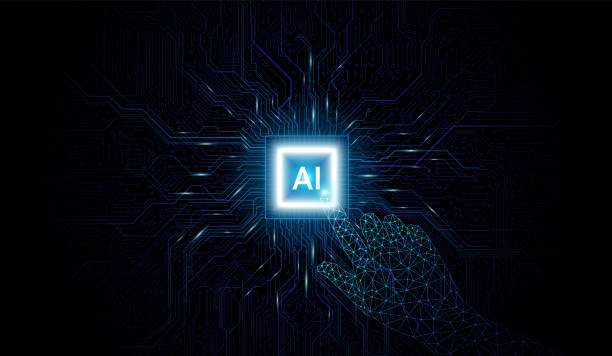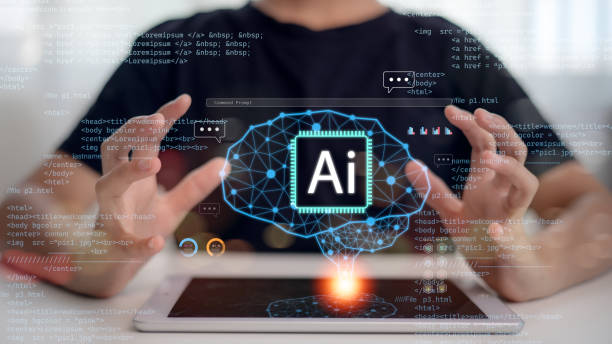What is Artificial Intelligence and Why Is It Important?

#Artificial_Intelligence (#AI) refers to a branch of computer science that aims to build machines capable of performing tasks that currently require human intelligence.
This includes learning, reasoning, problem-solving, language understanding, and pattern recognition.
The importance of AI lies in its ability to automate tasks, increase productivity, improve accuracy, and make better decisions.
AI can revolutionize various fields including medicine, finance, manufacturing, transportation, and customer services.
In summary, AI gives machines the ability to think, learn, and act like humans.
This technology is rapidly advancing and has great potential to improve our lives.
For example, AI is used in disease diagnosis in the medical sector, autonomous vehicle development, and the creation of intelligent financial systems.
Artificial intelligence (AI) aims to create systems that can automatically solve problems and make intelligent decisions by utilizing complex algorithms and models.
These systems are capable of learning from data, identifying patterns, and acting upon them.
Are you concerned that your company’s old website is driving away new customers? Rasaweb solves this problem with a modern and efficient corporate website design.
✅ Increases your brand credibility.
✅ Helps attract targeted customers.
⚡ Contact Rasaweb for a free consultation!
History and Evolution of Artificial Intelligence

The history of artificial intelligence dates back to the 1950s, when researchers like Alan Turing and Marvin Minsky began exploring the possibility of building intelligent machines.
In the early decades, the focus was on solving simple problems and logical reasoning.
However, progress was limited, and AI faced periods known as “AI winters”.
In recent decades, with advancements in computer processing power, access to big data, and the development of new algorithms, AI has been revitalized.
Machine learning, and especially deep learning, played a significant role in this progress.
Today, AI is used in various fields such as natural language processing, computer vision, and robotics.
Learn more.
The evolution of #AI is an ongoing process, and with each new advancement, new possibilities and applications emerge for it.
Researchers are working to build AI systems capable of better understanding the world, interacting naturally with humans, and solving more complex problems.
AI is now recognized as a transformative force in global society and economy.
Types of Artificial Intelligence and Their Applications

Artificial intelligence can be divided into two main categories: Narrow AI and General AI.
Narrow AI is limited to performing a specific task, such as facial recognition or playing chess.
General AI, which is still under development, aims to create machines capable of performing any task that humans can.
The applications of AI are very extensive and include the following:
- Medicine Diagnosing diseases, developing drugs, and providing personalized care.
- Finance Fraud detection, risk management, and financial advisory.
- Manufacturing Automating production lines, quality control, and predicting equipment failures.
- Transportation Developing autonomous vehicles and optimizing routes.
- Customer Services Answering questions, providing support, and resolving issues.
Currently, most AI systems are of the Narrow AI type.
However, research in General AI is rapidly advancing, and it is expected that we will see the emergence of smarter and more capable machines in the future.
| Type of AI | Application |
|---|---|
| Narrow AI | Facial Recognition |
| General AI | (Under Development) |
Machine Learning and Deep Learning – The Driving Force of AI

Machine Learning and Deep Learning are two important subsets of artificial intelligence that enable machines to learn from data and improve their performance without explicit programming.
Machine learning uses various algorithms to extract patterns and relationships from data.
Deep learning, which operates based on artificial neural networks, is a more advanced method of machine learning that can extract more complex patterns from data.
Deep learning has performed very well in fields such as computer vision, natural language processing, and speech recognition.
For example, the facial recognition and machine translation systems we use today utilize deep learning.
More information.
Both machine learning and deep learning methods require a lot of data to learn effectively.
With increased access to data and computer processing power, these two methods are rapidly advancing and play an important role in the development of AI.
#Machine_Learning is one of the main pillars of AI advancement.
Does your current website convert visitors into customers or drive them away? Solve this problem forever with professional corporate website design by Rasaweb!
✅ Build strong credibility and branding
✅ Attract targeted customers and increase sales
⚡ Get a free consultation now!
Challenges and Limitations of Artificial Intelligence

Despite significant advancements, artificial intelligence still faces challenges and limitations.
One of the main challenges is the need for large amounts of high-quality data to train AI models.
Also, AI models may become overly dependent on training data and perform poorly when encountering new and different data.
Another challenge is the issue of interpretability.
Many AI models, especially deep learning models, operate as black boxes, making it difficult to understand why a particular decision was made.
This issue can reduce trust in AI systems.
Furthermore, ethical and social issues are among the important challenges in the field of AI.
The use of AI can lead to job losses, discrimination, and privacy violations.
To address these challenges, we need to formulate appropriate laws and regulations and create public awareness about the pros and cons of AI.
The Future of Artificial Intelligence – What Should We Expect?

The future of artificial intelligence is very bright and full of potential.
AI is expected to play a more significant role in our lives in the coming years.
With advancements in fields such as natural language processing, computer vision, and robotics, AI systems will be capable of performing more complex tasks and interacting more naturally with humans.
AI is expected to bring about major transformations in areas such as healthcare, education, transportation, and energy.
Furthermore, AI can help solve global problems such as climate change, poverty, and infectious diseases.
The future of AI.
However, to realize this potential, we must seriously consider the challenges and limitations of AI and strive to resolve them.
Also, we must pay attention to the ethical and social issues related to AI and ensure the responsible and fair use of this technology.
AI has the potential to improve all our lives.
Key Concepts in Artificial Intelligence

To better understand artificial intelligence, familiarity with some key concepts is essential:
- Algorithm A set of instructions that tells a computer how to perform a task.
- Data Information used to train AI models.
- Model A mathematical representation of a system or process that has learned from data.
- Learning The process of improving a model’s performance using data.
- Neural Network A computational model inspired by the structure of the human brain.
Familiarity with these concepts will help you better understand articles and resources related to AI and enable you to speak about this technology with greater awareness.
AI seeks to solve complex problems using these concepts.
| Concept | Explanation |
|---|---|
| Algorithm | Instructions |
| Data | Information |
| Model | Mathematical Representation |
How to Enter the World of Artificial Intelligence?

If you are interested in artificial intelligence and want to enter this field, there are various ways.
You can start by learning the basic concepts of AI, machine learning, and deep learning.
Many educational resources are available online, including online courses, books, and articles.
Also, you can gain practical experience by participating in AI projects and working with relevant tools and libraries.
Some popular programming languages for AI include Python, R, and Java.
Python is a popular choice for AI developers due to its simplicity and the availability of powerful libraries like TensorFlow and PyTorch.
AI career path.
Additionally, you can meet AI experts and learn from their experiences by attending conferences and workshops.
Entering the world of AI requires effort and perseverance, but with continuous learning and practice, you can become an AI expert.
#Entering_AI requires knowledge and skill.
Tired of your company’s website not getting the visibility it deserves and losing potential customers? Solve this problem forever with professional and effective website design by Rasaweb!
✅ Increase brand credibility and earn customer trust
✅ Attract targeted sales leads
⚡ Contact us now for a free consultation!
Artificial Intelligence and Businesses

Artificial intelligence can help businesses in various fields.
Including:
- Improved Efficiency Automating repetitive tasks and reducing costs.
- Increased Sales Providing personalized offers and improving customer experience.
- Better Decision-Making Analyzing data and providing valuable insights for better decisions.
- Risk Reduction Detecting fraud and predicting problems.
Many businesses are currently using AI to improve their performance.
For example, retail companies use AI to offer personalized suggestions to their customers, financial companies use AI for fraud detection, and manufacturing companies use AI to automate their production lines.
If you own a business, you should consider using AI to improve your business performance.
#AI_in_Business can bring about major transformations.
AI is very important for business growth and development.
Ethical and Social Issues in Artificial Intelligence

The use of artificial intelligence is accompanied by numerous ethical and social issues.
One of the main issues is discrimination.
If the training data used to train AI models is biased, the AI models may also act in a discriminatory manner.
Another issue is privacy.
AI systems can collect and analyze a lot of personal data, which can lead to privacy violations.
Furthermore, the issue of accountability is also raised.
If an AI system makes a mistake, who is responsible?
To address these issues, we need to formulate appropriate laws and regulations and create public awareness about the pros and cons of AI.
Also, we must pay attention to the ethical and social issues related to AI and ensure the responsible and fair use of this technology.
Artificial intelligence should be for the benefit of society.
It is important to note that AI is a tool, and how it is used depends on us.
By using AI responsibly and fairly, we can benefit from its advantages and prevent its disadvantages.
AI is an opportunity, not a threat.
Frequently Asked Questions
| Question | Answer |
|---|---|
| What is artificial intelligence? | It is the simulation of human intelligence in machines programmed to think like humans and imitate their actions. |
| What are the main branches of artificial intelligence? | They include machine learning, deep learning, natural language processing, computer vision, and robotics. |
| What is Machine Learning? | It is a branch of artificial intelligence that focuses on enabling systems to learn from data and identify patterns without explicit programming. |
| Mention examples of AI applications in our daily lives. | Voice assistants (like Siri and Alexa), recommendation systems in Netflix and Amazon, self-driving cars, and facial recognition software. |
| What is Deep Learning? | It is a subset of machine learning that uses multi-layered (deep) artificial neural networks to process large amounts of data. |
| What is Natural Language Processing (NLP)? | It is a branch of artificial intelligence that focuses on enabling computers to understand, interpret, and generate human language. |
| What are some ethical concerns related to AI? | They include data bias, privacy, job displacement, and accountability in case of errors. |
| What are the main benefits of AI? | Increased efficiency, improved decision-making, automation of repetitive tasks, and discovery of complex patterns in data. |
| How is AI used in healthcare? | In disease diagnosis, drug discovery, medical image analysis, and personalized patient care. |
| How do you see the future of AI? | It is expected to continue evolving rapidly, impacting all aspects of human life, from industry to education and entertainment. |
And other advertising services by Rasaweb Advertising Agency
- Smart Customer Journey Map: Designed for businesses seeking to increase website traffic through user experience customization.
- Smart Sales Automation: An innovative platform for improving customer acquisition with custom programming.
- Smart Conversion Rate Optimization: A professional solution for user engagement focusing on marketing automation.
- Smart Advertorials: A professional solution for increasing sales with a focus on precise audience targeting.
- Smart Marketplace: Designed for businesses seeking to increase click-through rates through precise audience targeting.
And over hundreds of other services in the field of internet advertising, advertising consultation, and organizational solutions
Internet Advertising | Advertising Strategy | Advertorials
Resources
AI Guide: From Introduction to ApplicationsWhat is Artificial Intelligence and What Are Its Applications?What is Artificial Intelligence? (Virgool)Comprehensive Guide to Artificial Intelligence | Faradars
? Rasaweb Afarin, by providing comprehensive digital marketing services, from multilingual website design and SEO to content marketing and social media, guides your business to new horizons of success. Contact us for consultation and to enhance your online presence.
📍 Tehran, Mirdamad Street, next to the Central Bank, South Kazerun Alley, Ramin Alley No. 6



